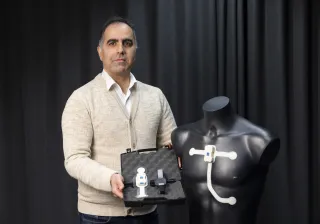Quantum computing is a field that inspires both curiosity and concern. VTT quantum technology strategists Himadri Majumdar and Pekka Pursula decided to answer some of the most mind-boggling questions around all things quantum right now.
1. Is quantum computing going to replace classical computing?
We’ve become so used to computers developing faster and faster that we expect quantum computers to be just around the corner. The general public might be thinking that their next laptop will be a quantum computer.
The fact is that quantum computers as we know them now are extremely powerful only in certain types of problems. That means that even in the long run they will probably not be optimal for all problems. They’re not going to replace standard computing altogether, but add to the range of computational tools we will have to tackle different sorts of challenges.
2. Is quantum computing going to destroy cybersecurity?
In 2021, a scientific paper came out analysing how a quantum computer with a 20 million qubit chip can break current RSA encryption in just 8 hours. This would take our current best computers well over a million years to break. That obviously created a lot of interest. However, current quantum computers have mere hundreds of qubits in them, so it is safe to say that no existing quantum computer can break our current best encryptions yet. But the threat exists. Sometimes we use less powerful encryption, and quantum computers and algorithms are getting better every day.
At the moment, for any hacker the investment to build or access a quantum computer far outweighs the benefits of it breaching cybersecurity of high-enough value. This does not mean we should let our guard down. Thankfully, some very smart people are already working on a solution. There are already algorithms being developed to mitigate the cyber-threat of quantum computing. Post-quantum cryptography, i.e. encryption methods that are not vulnerable to quantum computers are being developed right here at VTT. Some Finnish companies already provide such solutions. Even if in future hackers would have access to quantum computers, protecting yourself from quantum attacks would just be a question of keeping your web browser and virus protection software updated – as you should already be doing.
3. When is it actually going to be here?
When quantum is actually going to happen means different things to different people. It could take fifty years to have a universal one that anyone could have access to, but the next experimental example might be just around the corner, meaning next year. At VTT we talk about business advantage, which means solving some problems with quantum computers faster than on standard computers. That requires businesses and industries preparing themselves to adopt quantum technology at the right time for them in order to gain cost benefits in their specific products, processes or services. Those things won’t all happen at the same time.
If someone claims they already have a quantum desktop computer, it’s not going to have much capacity yet. Having a quantum computer with only a low number of qubits in it is not going to help us with real-life problems. There has even been talk of quantum computers in mobile phones within 20 years. However, there are still some quite hefty hurdles standing in the way of pocket-size quantum devices: mainly the fact that quantum computers are still huge in size. They need an entire room! Quantum computing itself happens in a very small space, but the required support systems, such as cooling machines and controlling electronics, are still very large. Shrinking these is going to take time. However, we should remember that in the 1970s nobody dared to dream that in fifty years we would all have computers in our pockets – so who knows what can happen in the next fifty years!
4. BONUS QUESTION: When will we be able to teleport?
Quantum computers are built on a physics principle called entanglement. Entanglement can theoretically be seen as teleportation of information. Couldn’t we then also build machines to teleport people and things?
Nope. Quantum scientists acknowledge that our world seems to be non-local, in a weird way, but that does not mean teleporting people, or any mass around. Quantum computers won’t help us teleport, however handy that might seem.





